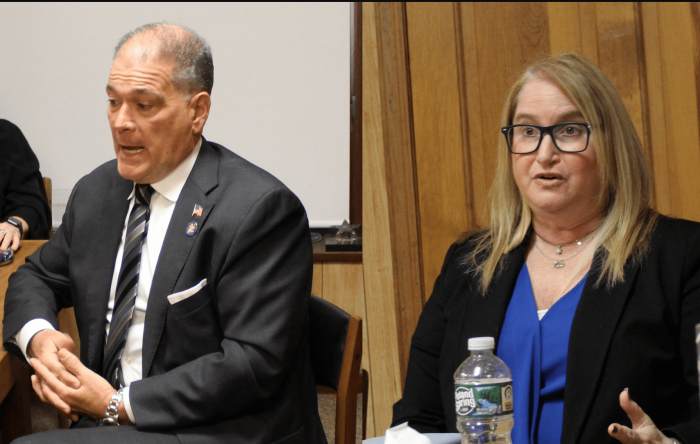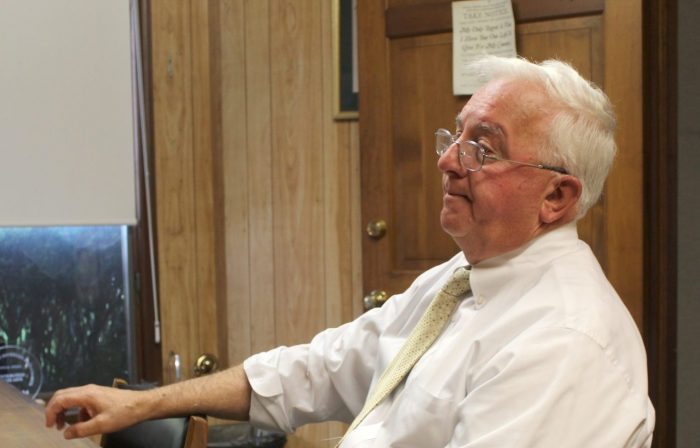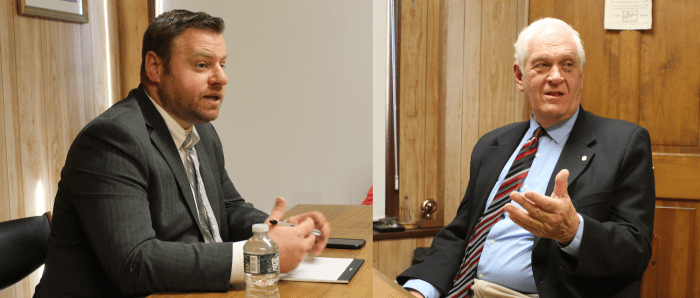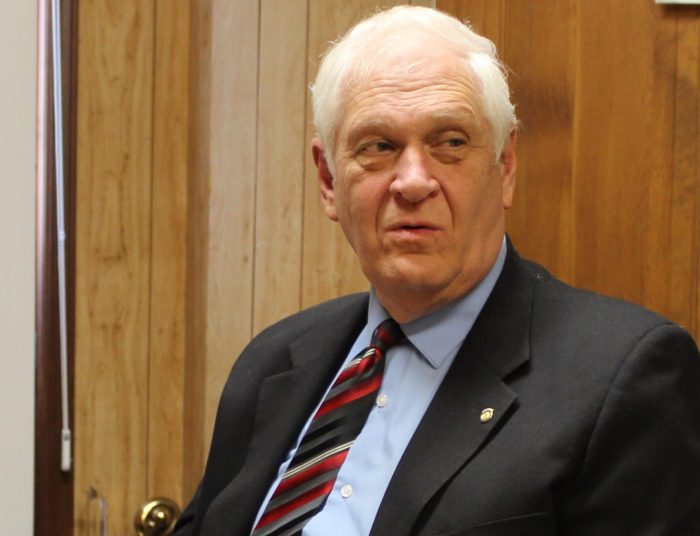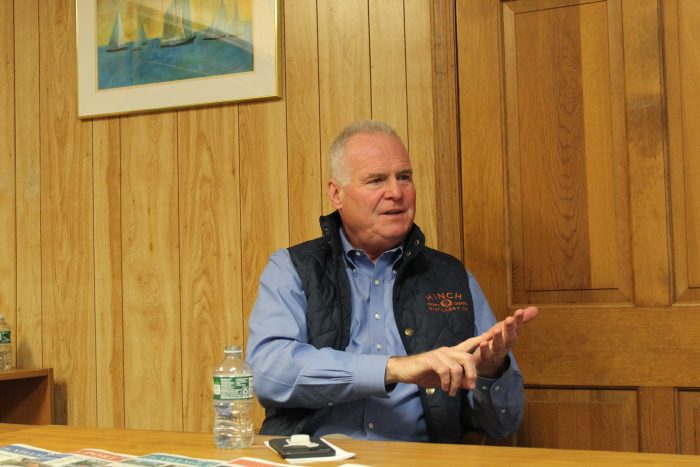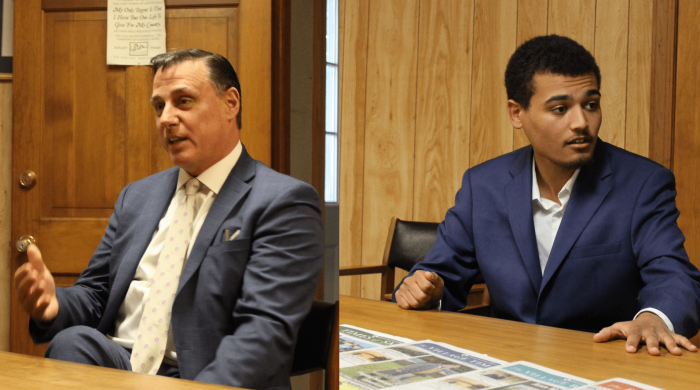In the New York State Assembly race in the 12th District, incumbent Keith Brown (R-Northport), who was elected to the office in 2020, is being challenged by Democrat Cooper Macco. The latter is a consumer bankruptcy attorney who lives in Halesite.
Brown’s campaign didn’t respond to requests from TBR News Media to participate in a debate with Macco at our offices. Macco was interviewed over the phone. Brown’s camp also did not respond to a request for a phone call, and his comments in this article are taken from an Oct. 26 debate with his opponent hosted by the League of Women Voters of Huntington and his campaign website.
In addition to northern and eastern sections of Huntington, the 12th Assembly District also includes the northeast section of Babylon and northwest section of Islip.
Cooper Macco
For Macco, it was his clients experiences that led him to the state Assembly race.
“Working as a bankruptcy attorney kind of showed me a lot of the issues facing Long Islanders right now, particularly financial issues that you’re seeing everywhere as a result of the high cost of living, the lack of affordable housing, lack of health insurance, high medical costs related to loss of insurance or other unexpected illness or injury,” he said.
Long Island needs to have its fair share of the New York State budget, he said, “in order to expand infrastructure and make much-needed capital improvements. I think that, right now, we are seeing a lot of money leave Long Island to go upstate.”
In addition to addressing infrastructure budgetary concerns, Macco said it’s also important to preserve water quality.
“As Long Islanders, I think we are so lucky to have the water around us, the natural resource around us,” he said. “I think we need to make sure that we can preserve that for future generations. We have such high nitrogen levels in the water which leads to algae blooms, fish kills as a result of that. Largely that’s due to cesspools and septic tanks that are leaching into our groundwater.”
He added the district needs to move toward self-contained home wastewater treatment centers and to expand Huntington and Northport sewers, “including in some residential areas.”
Financially, he said he would seek to help working families with expanding universal pre-K, child care tax credits and grants for child care providers.
“You see a lot of families on Long Island who are put in a situation where surviving on a single income on the Island is very difficult,” he said. “And a lot of times you have a family, young family, that has child care needs, and in such certain situations, you see people working just to afford child care. The cost of child care on Long Island is only getting higher, it’s only getting harder to find that in an affordable way.”
He added he feels pre-K programs help with food insecurity, too.
“The most innocent, the most vulnerable children have a place where they can get one or two meals a day without issue and that can start at a younger age,” he said.
Macco said currently the universal pre-K system is good, but it’s still on a lottery basis. He said he will aim to make it a global option for all.
Regarding public schools on Long Island, Macco said while there are excellent schools in the district, more funds can always be used.
“I think we need to make sure that money in the budget is going into public schools, and not being rerouted by entities looking to operate charter schools and operate for-profit institutions that are only taking money from the public schools,” Macco said.
He is a proponent for expanding public transportation on Long Island, including a more comprehensive railroad system in Suffolk County with the mode of transportation connecting into more areas. The hope, he said, is for fewer people relying on driving everywhere. “The cost of living and working on Long Island is high,” he said. “So, we need to make sure that people who work on Long Island can live on Long Island.”
Touching on the subject of cashless bail, Macco said he would like to see slight amendments such as more judicial discretion, but said he supports bail reform as it is overall.
“It’s important to remember the purpose of bail and the purpose of the bail reform,” he said. “Bail reform was to prevent underprivileged people who couldn’t afford cash bail, to avoid sitting in jail for several months or a year awaiting trial. People are innocent until proven guilty.”
Keith Brown
Brown, who is a practicing attorney, said during the League of Women Voters debate that his career experience has been an asset during his two-year tenure as an assemblyman.
“What sets me apart from my opponent is really my experience,” he said. “It’s that 27 years of building relationships, of working as a municipal lawyer in all of the towns throughout Long Island.”
He gave the example of working with five layers of government to get Northport Harbor dredged. Brown said working with elected officials throughout the years led to him getting the help he needed in this pursuit.
During the debate, the assemblyman said his top concerns are public safety, hyperinflation and the opioid epidemic. He added there is a supermajority in both houses, and it’s important to have checks and balances.
“New York state is a mess right now, and it’s a mess because it’s been controlled by one party for far too long,” Brown said.
The assemblyman said while there have been measures to help residents during the recent rise in inflation, including the gas tax moratorium, he believes there also needs to be assistance when it comes to groceries and heating oil.
“There’s a lot of hurting people out there,” he said. “We have food insecurity here in Huntington and Babylon and in Islip. These things are happening around us.”
On his campaign website, Brown said the New York State budgets in two years rose from $176 billion to $212 billion.
“We should cut unnecessary, wasteful spending, help drive inflation down and demand more fiscal conservatism in Albany,” he wrote.
The assemblyman also commented on bail reform at the Oct. 26 debate.
“We have seen the harmful effects of cashless bail in the state of New York,” he said.
In order to reform the current law regarding cashless bail, he said meaningful and comprehensive revisions need to be done. He would elicit the help of judges, district attorneys, public defenders and victim rights groups.
He said one of the downfalls of bail reform has been that addicts no longer have the choice of treatment in lieu of incarceration if arrested.
Brown is a member of the Assembly’s Alcoholism and Drug Abuse Committee. According to his campaign website, he has advocated “that the Opioid Settlement Fund be distributed as quickly as possible and given Suffolk County recommendations on where these funds should be allocated.”
On his campaign website, Brown calls to “fully repeal bail reform, restore judicial discretion and eliminate crime from our streets and public transportation.”


